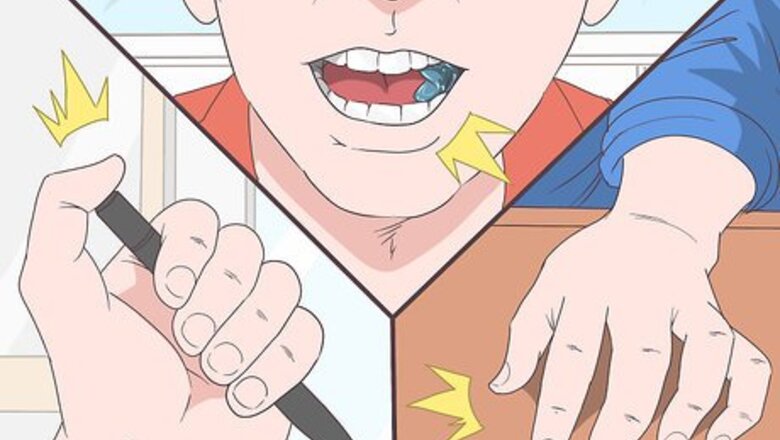
views
X
Trustworthy Source
PubMed Central
Journal archive from the U.S. National Institutes of Health
Go to source
Having misophonia can be frustrating, but you can learn ways to better cope. Start by finding your triggers, then learn better ways to cope with them. You can also reduce your reaction to your triggers or get medical treatment, if necessary.
Finding Your Triggers
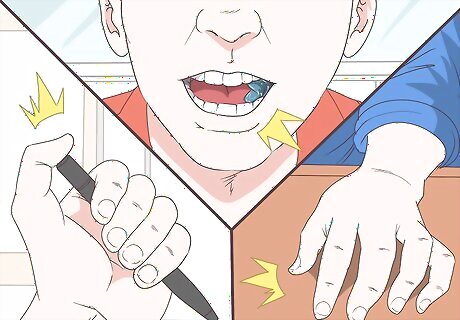
Know common misophonia triggers. It’s easier to deal with your misophonia if you know what causes it. You can then avoid your triggers or plan how you’ll deal with them. While any sound can be a trigger, there are common misophonia triggers. Here are some typical triggers, though you may have others, as well: Gum smacking Chewing Breathing Nasal sounds Crunching Grunting Lip smacking Pen clicking Tapping Wrappers Crying babies Cars TV or radio sounds
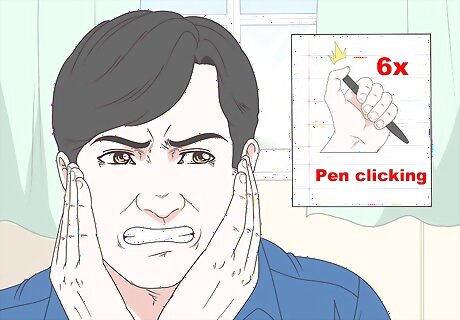
Notice what sounds cause you to experience stress. Any sound can trigger your misophonia, so it’s important to consider anything that causes you to have a reaction. Keep a record of how many times a particular sound triggers you. If you only have one reaction, that sound might not be a trigger. However, if you have several or frequent reactions to that sound, it is likely a trigger.
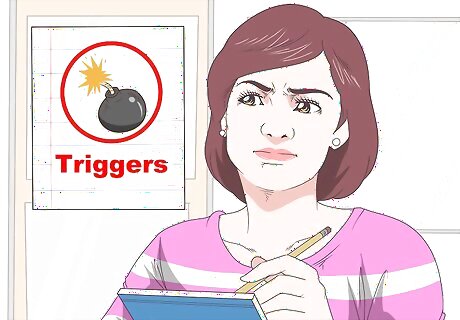
Write down what’s happening when you start to feel anxious or upset. Note what is happening, then look for trends. Once you find a trend, think about what types of sounds you were hearing. This can help you identify sound triggers. For example, you might notice that you’re often upset during study hall. You could list the sounds you commonly hear in study hall to determine which one could be a trigger. You might figure out that the sound of a pencil scratching against paper triggers you.
Coping with Triggers

Avoid your triggers when you can. Leave the room to get away from the sound. Change your habits to limit your exposure to triggers, such as moving to a quieter part of the library to study. Create a trigger-free environment for yourself as much as you can. Ask for help if it’s available. For example, you might talk to your boss or teacher about working in a quiet environment. Request a desk that’s in the most secluded area and farthest away from your triggers. When making adjustments, try not to give up what's important to you. For instance, if you want to eat with your loved ones, but you are triggered by their chewing noises, find ways to diminish the noise rather than giving up the experience. Be mindful when choosing where to live or work. For example, don't choose a home that's located near a railroad or airport, which can get very noisy.
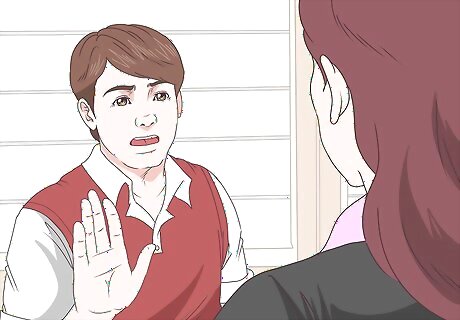
Ask the person to stop making the noise, when it’s appropriate. If someone’s making a sound that’s frustrating you, they likely don’t know it. Tell them how you feel and ask them to stop, if you can. This can resolve the issue quickly and painlessly! For example, ask your coworker to stop clicking their pen. Say, “Hey, your pen clicking is really distracting me. Would you mind stopping?” It might not be appropriate to ask your boss to stop or a stranger to stop making a noise. Similarly, some people might not be able to help it. Use your judgement when asking someone to stop.

Mimic your trigger sounds when you hear them. Misophonics usually don’t have the same reaction to their trigger sounds when they themselves make them. Because of this, mimicking the offensive sounds can help you better cope with them. This is particularly useful when you need to keep your cool in an important setting, such as a work meeting. For example, if you hear someone clicking a pen, click your pen. If someone smacks their lips, smack yours.
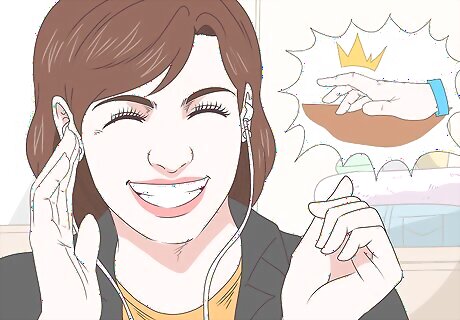
Wear noise-reducing headphones when you’re around your triggers. These are a convenient way to deal with triggers in the workplace or while you’re in public. They can block out most of the offensive sounds, letting you enjoy silence. Carry your headphones with you at all times. At school or work, ask your teacher or boss if you can use your headphones when you’re working independently. If you can’t listen to music, show them that the headphones don’t play music or opt for ear plugs instead.

Listen to music to cover up the sound of your triggers. Music can also help you cover up the unwanted noise. Choose whatever type of music relaxes you, or whatever music effectively drowns out the noise. Listening to your music using earbuds or headphones is usually best for drowning out offensive sounds.

Distract yourself from the sounds. Any type of mental distraction can help! You might play a game, do a crossword puzzle, color in an adult coloring book, tell yourself a story, look for a color in your environment, or any other activity that distracts you. The best options for you depend on your personal preference. Carry a book of puzzles with you. Download a game onto your phone. Use a coloring book or carry a coloring book.
Do deep breathing exercises to relax. Monitor your breath as you inhale deeply and exhale slowly. Count to 5 as you inhale, then count to 5 as you exhale. Repeat for 5 breaths, then breathe normally. If you're still feeling stressed, you can count your breaths.
Perform progressive muscle relaxation to stay calm. Starting at your toes, tense your muscles. Take a deep breath, then relax the muscles. Move up your body to the next muscle group, tensing, breathing, and then relaxing. Continue to tense and relax each muscle group until your entire body feels relaxed. You can also incorporate visualization into your progressive muscle relaxation. For example, you might imagine that rays from the sun are warming your skin. Progressive muscle relaxation is something you can do on your own, but you can also find videos online that will guide you through the activity.
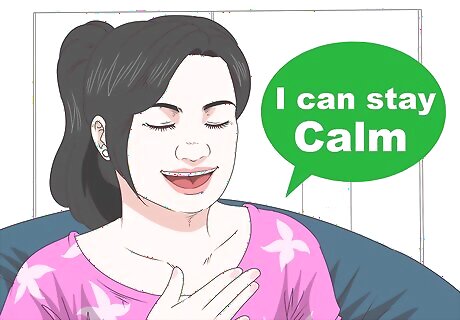
Use positive self-talk to calm yourself down. Simply put, positive self-talk means saying nice things to yourself. It’s similar to using affirmations. To use it, notice when you’re thinking negative thoughts, then replace them with honest, positive statements. You can also just repeat the positive statements to yourself. You might say to yourself, “I don’t need to react to this sound. I’m annoyed right now, but I only need to deal with it a little longer. I can stay calm.” You could repeat, “This too shall pass. I am strong.”

Prepare an escape strategy for times you’re overwhelmed. It’s a good idea to keep a mental or physical list of ways to get out of situations. Plan options for different types of situations, such as work meetings, class sessions, recreational outings, dinners, etc. You could excuse yourself to go to the restroom or volunteer to retrieve something for yourself or others. You might say, “I’m going to get some napkins. Do you need any?”
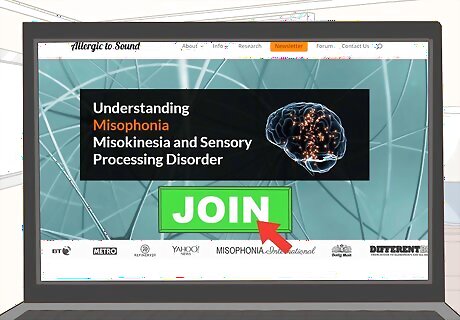
Join a support group for misophonics. You can find several support groups online with a simple search. This allows you to share your experiences and concerns with other misophonics. You can also get and receive advice through these groups. You can look for an in-person group by checking with local clinics and searching online. However, it’s a relatively new diagnosis, so it may be hard to find a group that meets in your area.
Reducing the Effects of Misophonia
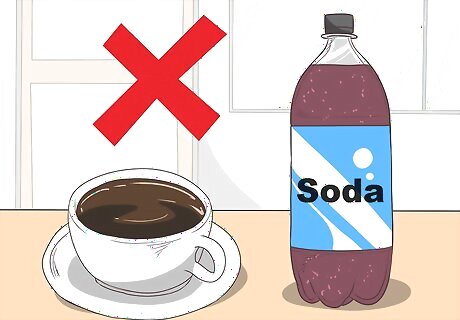
Limit your consumption of caffeine. Some people have worse misophonia reactions after they have caffeine. It might make you more alert to the sounds that trigger you. It’s best to avoid caffeine if it seems to make your symptoms worse. For example, don’t drink coffee and soda, especially when you’re around your triggers. Pay attention to how you feel after you consume caffeine. Do you have more episodes on days you take a morning coffee break? If not, caffeine may not affect you as much.
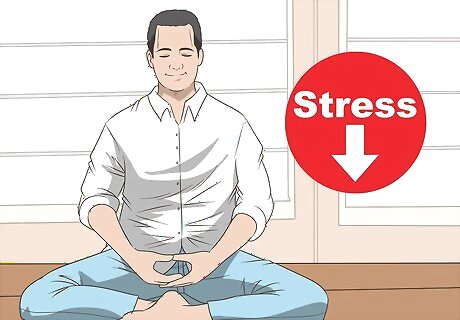
Learn ways to reduce your stress. Your misophonia likely causes you stress, which is the main cause of your discomfort. Also, stress can make your reactions worse. Lowering your stress can help you reduce the intensity of your misophonia reactions. Here are some stress relief strategies that can help you: Use mindfulness to ground yourself in the present. Meditate to calm your mind. Go for a walk in nature. Do something creative. Take a long bath. Drink a calming tea. Do progressive muscle relaxation.
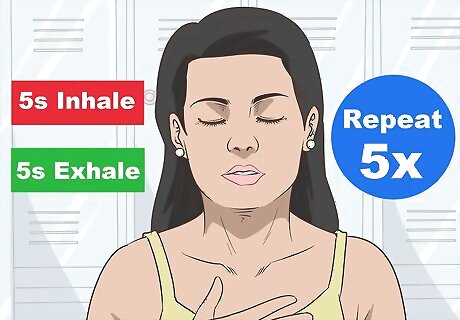
Take deep, calming breaths to relax. Breathing deeply can help you stay calm. This helps you minimize your reactions to your triggers. Additionally, you can get relief faster. Here are some other ways to use breathing exercises to calm down: Focus on your breath, feeling the air go in and out. Count your breaths. Inhale for 5 seconds, then exhale for 5 seconds. Repeat 5 times.

Relax your muscles. Misophonia can cause your muscles to tighten up because it causes you to go into a fight-or flight response. You’ll feel much better if you relax them, which you can do using progressive muscle relaxation, physical exercise, or stretching. Try progressive muscle relaxation! Starting at your toes, concentrate on each muscle group. Tighten then release them. Continue to tighten and release your muscles, moving from your toes up to your head. You can repeat this process until you feel relaxed. Exercising helps because it releases some of the tension in your body. You might go for a walk, dance to your favorite music, run, or go to the gym. You could also play a recreational sport. Do what works for you. Stretch or do yoga to work out your muscles and relax.
Getting Professional Help

Visit your doctor to rule out other causes. Misophonia is a real condition, but your symptoms could be caused by something else. It’s best to get checked out by your doctor to make sure there aren’t other underlying causes behind your sensitivity to sound. If there is another cause behind your condition, your doctor can help you get the right treatment.
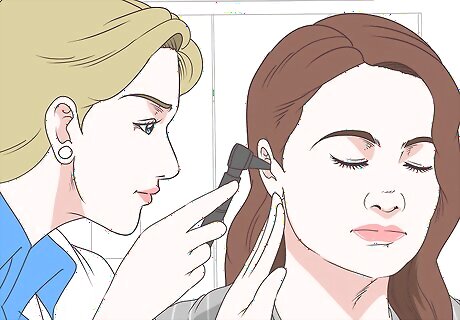
Visit an audiologist to get your hearing checked. Hearing issues can cause similar problems to misophonia. For example, tinnitus, which is a ringing in your ears, is a similar condition. An audiologist can rule out these causes or help you get proper treatment. If another issue is causing your sensitivities, you might find relief with the right treatment, so it’s in your best interest to get your hearing checked.

Work with a therapist to rule out conditions and learn to cope. A therapist can determine if your issues are caused by another issue, such as auditory hallucinations. Additionally, they can help you identify better ways to deal with your triggers and reduce your reactions to them. Cognitive behavioral therapy (CBT) is a helpful form of talk therapy. Your therapist can help you learn to better manage your stress and learn to cope with triggers. Tinnitus retraining therapy (TRT) can help as well, since misophonia is similar to tinnitus. Tinnitus is usually a ringing in your ears or the perception of a sound that isn’t there. You will learn to react differently to the sounds that trigger you and to perceive the sounds differently













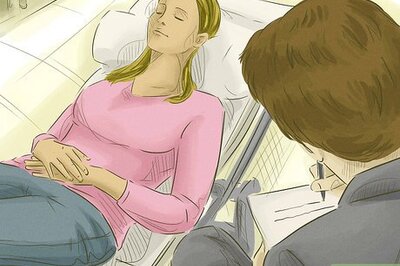


Comments
0 comment